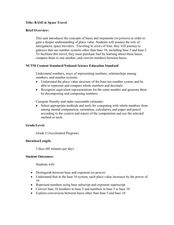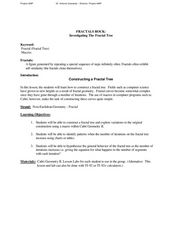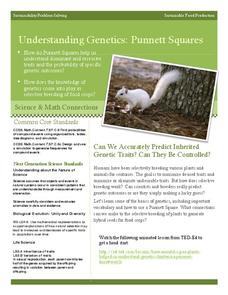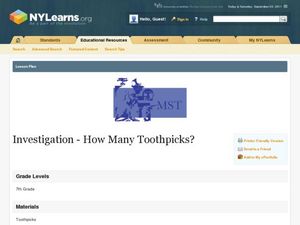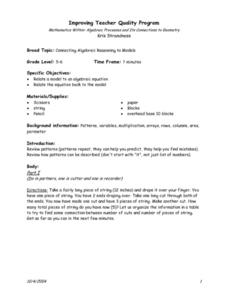Curated OER
Patterns, Relations, and Functions: Lesson 3: Numerical Patterns
Fourth graders extend and continue numerical patterns using function or input/output machines. They finish the increasing patterns using input/output tables, and generalize the rules that apply to the pattern. They complete the...
Curated OER
Investigation - Square Numbers and Triangle Numbers
Fifth graders investigate growth patterns using blocks. In this square and triangle numbers lesson, 5th graders predict sizes of larger triangles and squares based on numerical patterns they observed while building.
Curated OER
Stressed to the Breaking Point
Young scholars explore the relationship between the amount of weight that can be supported by a spaghetti bridge, the thickness of the bridge, and the length of the bridge to determine the algebraic equation that best represents that...
Curated OER
Problem Solving
Fifth graders read and write equations. In this equation writing lesson, 5th graders use real life scenarios to write equations. Students use manipulatives, draw pictures and make tables to understand how to write equations. Students...
Curated OER
Trigonometry Practice Series #3
In this trigonometry instructional activity, students calculate the sum of the terms in an arithmetic and geometric series. This two-page instructional activity contains 5 multi-step problems. Answers are provided at the bottom of the...
Curated OER
Extending Online Number Sequences
In this online number sequences worksheet, students work out the answers to eight comprehensive exercises with thirty-eight calculations involving a variety of sequences. Students answers are automatically graded online as they go and...
Curated OER
Honors Algebra 2 Reivew: Practice with Sequences
In this practice with sequences worksheet, students find the arithmetic sequence and geometric sequence of given problems. They determine the percent of change and solve exponent problems. This one-page worksheet contains 11 problems.
Curated OER
BASE-ic Space Travel
In this 3-day place-value lesson, upper-elementary kids investigate the base 5 and base 2 systems as an introduction to exponents and powers. They create a pocket chart to help ground their understanding of bases, exponents, and powers,...
Curated OER
Fractals Rock
Students identify the repeated sequences of a pattern. In this geometry lesson, students identify fractals in patterns and nature. They construct a fractal tree and make conjectures.
Curated OER
Paying Patterns
In this math worksheet, students practice examining the concept of exponential increase within the context of paying a salary that starts as one penny per day.
Curated OER
Squares and Cubes
Middle schoolers recognize, analyze, and use square color tiles and interlocking cubes to discover patterns in perimeter, area, and volume. They will then chart and graph their results.
Curated OER
Marcy's Dots
Students identify the pattern changes that could occur in a series using pictures with dots. They use the patterns on the worksheets to have a context to describe pattern in words. Students look to find the linear, quadratic, or...
Pennsylvania Department of Education
Multiple Patterns
Students explore patterns that involve doubling numbers. In this multiple patterns lesson, students use objects to explore these patterns while recording them using a table. Students recognize even and odd number patterns while applying...
Curated OER
Perimeters, Patterns, and Conjectures
Students discover patterns and write conjectures relating to perimeters and polygons. Working in cooperative learning groups, they use manipulatives and graphic organizers to solve problems then answer a series of questions in which they...
Curated OER
Changes in Force, Motion, and Energy
Eighth graders construct various machines and compare the work done by them.
Western Kentucky University
Understanding Genetics: Punnett Squares
Can scientists really predict genetic outcomes or are they simply making a lucky guess? Scholars first learn about Gregor Mendel and how to make Punnett squares. Then they extract DNA from a strawberry in a lab with included conclusion...
Rainforest Alliance
Forests of Guatemala
With 90 percent of its land area covered in forests, Suriname, a country in South America, contains the largest percentage of forests throughout the world. Here is an activity that brings classmates together to learn about the...
Utah Education Network (UEN)
Linear Relationships: Tables, Equations, and Graphs
Pupils explore the concept of linear relationships. They discuss real-world examples of independent and dependent relationships. In addition, they use tables, graphs, and equations to represent linear relationships. They also use ordered...
Curated OER
Counting Forward
Practice counting on from a number using these three sequence starters. Arranged in order of increasing difficulty, the first sequence begins at 5 and has learners add 9 numbers. The answers are written below each sequence, so they...
Curated OER
How Many Toothpicks?
Students investigate different geometric patterns. In this geometry lesson, students create different shapes using toothpicks. They create different patterns and designs and complete a charts using different measurements.
Curated OER
Review of Limits
In this limit worksheet, students review limits stated as an expression, analyze Euler's method applied to a rate equation, compute the terms of a given sequence, and identify a sequence as a convergence or divergence. this four-page...
Curated OER
Classroom Idea: Clap Along
Students study patterns. In this math lesson, students repeat a pattern that has been clapped out by the teacher. Actions can be added to increase difficulty level.
Curated OER
Connecting Algebraic Reasoning to Models
Young scholars analyze relating a model to an algebraic equation and visa versa. Patterns are reviewed in detail and then in pairs new models are created and then translated into a word problem or equation. They illustrate their models...
Curated OER
How popular is your favorite site?
Students gather data for the project for the entire year. They plot their data, try to fit a equation to their data, and speculate on why the data shows the pattern it does and project its future growth.









